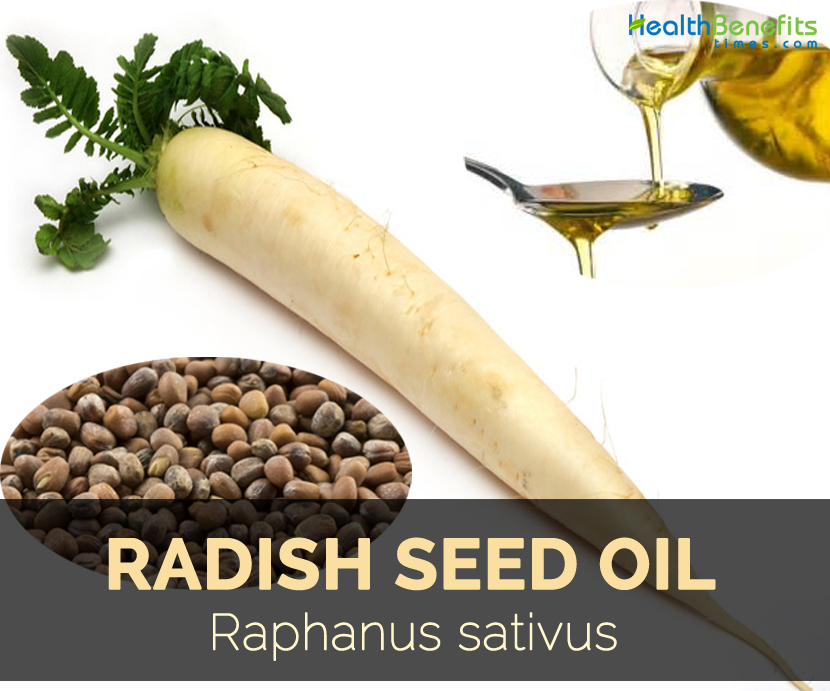| Radish seed oil uses and benefits Quick Facts | |
|---|---|
| Name: | Radish seed oil uses and benefits |
| Scientific Name: | Raphanus sativus |
| Origin | It was believed to be originated in South East Asia and was spread to the world. It is used for cooling purposes. Radish is commercially grown in Korea, Japan, Texas, China, California and Philippines. The Radish was used by Greek in 3rd century and Roman agriculturists in 1st century AD. |
| Colors | Light golden |
| Health benefits | Maintain healthy hair, scalp and nails, Nourish skin, Treat jaundice, Eliminate free radicals |
| Name | Radish seed oil uses and benefits |
|---|---|
| Scientific Name of Radish | Raphanus sativus |
| Native | It was believed to be originated in South East Asia and was spread to the world. It is used for cooling purposes. Radish is commercially grown in Korea, Japan, Texas, China, California and Philippines. The Radish was used by Greek in 3rd century and Roman agriculturists in 1st century AD. |
| Name in Other Languages of Radish | Albanian: rrepkë; Belarusian: radyska (радыска); Basque: errefautxo; Bulgarian: repichka (репичка); Bosnian: rotkvica; Croatian: rotkvica; Catalan: rave; Danish: radise; Czech: ředkev; Dutch: radijs; Finnish: retiisi; Estonian: redis; French: radis; German: Rettich; Galician: rabanete; Greek: rapanáki (ραπανάκι); Icelandic: radish; Hungarian: retek; Irish: raidis; Latvian: redīss; Italian: ravanello; Lithuanian: ridikas; Maltese: ravanell; Macedonian: rotkvica (ротквица); Norwegian: reddik; Portuguese: rabanete; Polish: rzodkiewka; Russian: redis (редис); Romanian: ridiche; Slovak: reďkev; Serbian: rotkvica (ротквица); Slovenian: redkev; Swedish: rädisa; Spanish: rábano; Welsh: rhuddygl; Ukrainian: redys (редис); Yiddish: retekh (רעטעך); Azerbaijani: turp; Armenian: boghk (բողկ); Chinese: Luóbo (萝卜); Bengali: Mūlā (মূলা); Gujarati: Mūḷō (મૂળો); Georgian: radish (რადიშ); Hmong: qos liab; Hindi: moolee (मूली); Japanese: Daikon (大根); Kazakh: şalğam (шалғам); Kannada: Mūlaṅgi (ಮೂಲಂಗಿ); Khmer: rea dei (រ៉ាដី); Lao: radish; Korean: mu (무); Malayalam: muḷḷaṅki (മുള്ളങ്കി); Mongolian: ulaan luuvan (улаан лууван); Marathi: Muḷā (मुळा); Myanmar (Burmese): mone lar ny ne (မုန်လာဉနီ); Sinhala: rābu (රාබු); Nepali: Mulā (मुला); Tamil: Muḷḷaṅki (முள்ளங்கி); Tajik: şalcamca (шалцамча); Telugu: Mullaṅgi (ముల్లంగి); Uzbek: rediska; Thai: H̄ạw chị thêā ( หัวไชเท้า); Arabic: fajal (فجل); Vietnamese: củ cải; Turkish: turp; Chichewa: radish; Afrikaans: radyse; Hausa: radish; Sesotho: radish; Igbo: radish; Somali: dabocase; Yoruba: radish; Swahili: figili; Zulu: isithombo; Filipino: labanos; Cebuano: radish; Indonesian: lobak; Malagasy: radish; Javanese: radish; Maori: rarihi; Malay: lobak; Esperanto: rafano; Latin: radicula; Haitian Creole: radi; |
| Extraction method | Solvent or expeller |
| Color | Light golden |
References:
http://www.cebraonline.com/daikon-radish-seed-oil-3492-p.asp
https://orglamix.com/products/daikon-radish-oil-natural-pure-dailkon-radish-oil-beauty


